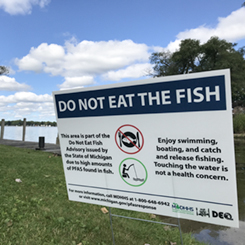Our July News to Us brings great news for the Huron with a recent announcement on funding from the Michigan Natural Resource Trust Fund. There are research results on public understanding of fish consumption advisories and the connection between forests and clean drinking water. Clean Water Act updates and a piece spotlighting local action on climate change across the U.S. round out what we are reading.
Gov. Whitmer approves $45.6 million in outdoor recreation development and acquisition grants
The latest round of Michigan Natural Resources Trust Fund grants, totaling $45.6 million, have been authorized by Governor Gretchen Whitmer following approval by the Michigan House and Senate. The 117 funded projects will advance land protection and parks and recreation improvements across the state, including a handful in the Huron River watershed. The MNTF funds will support a 258-acre land acquisition to consolidate ownership in the Waterloo-Pinckney Recreation Area and the construction of an accessible canoe/kayak launch at Frog Island Park in Ypsilanti.
Study finds around half of Great Lakes residents know about advisories outlining safe fish consumption
A recent study found that only about half the residents of the eight Great Lakes states know of fish consumption advisories, such as that for the Huron. The study discovered that around 5 million people eat more fish than the Environmental Protection Agency’s recommendation of no more than two meals per week. In addition, there are differences in awareness among groups, with women, people of color, and young people being less aware of fish consumption warnings and potential risks.

This article from the New York Times dives into how towns and cities across the United States are using policy to tackle climate change at a local level. The reporting details unique solutions employed by local communities to fit their own specific climate issues, including adoption of a carbon fee in Athens (Ohio), development of a climate plan in Fairfax County (Virginia), and a urban heat island mitigation efforts in Phoenix (Arizona).
Study finds need for public to see connection between forests and clean drinking water
New research from Michigan State University indicates most people are not aware of the connection between forests and clean drinking water. When asked to identify what ecosystem services forests provide, only 14 percent of interviewees picked clean drinking water. However, forest are vital to protecting water, rivers, wells, and aquifers. They clean polluted runoff and keep streams cool. Forests soak up rain, which can then infiltrate into groundwater to recharge rivers and drinking water wells. Read more on the importance of forests for water quality in a recent HRWC blog.
Anticipated updates to the Clean Water Act by the Environmental Protection Agency are expected to be delayed until the Supreme County rules on Sackett v. EPA in June 2023. The case could stymie the Biden Administration’s ability to redefine “waters of the U.S.” (WOTUS) under the Clean Water Act. However, the EPA is still working to reinstate a pre-2015 definition of WOTUS and finalize its recent rule to provide states and tribes more agency in reviewing permits for large natural resources projects.



